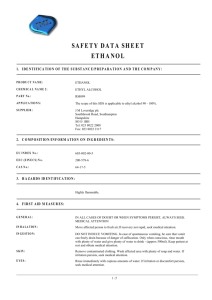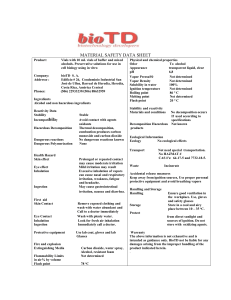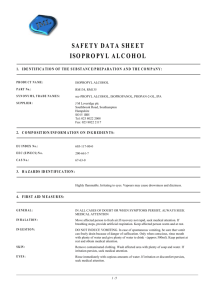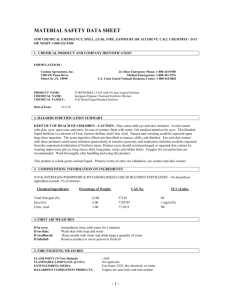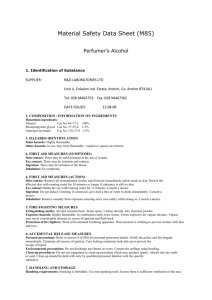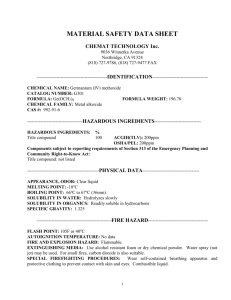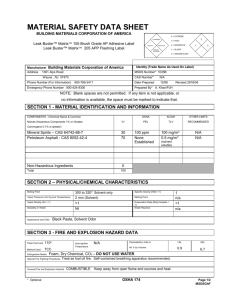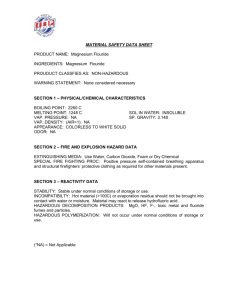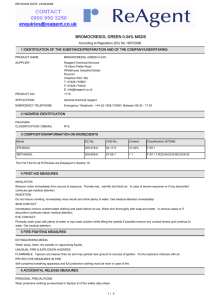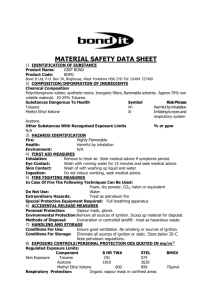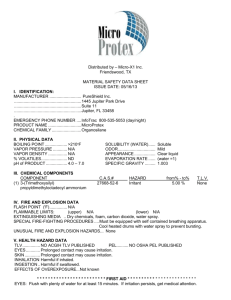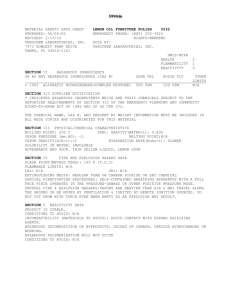Document - Chemat Scientific
advertisement
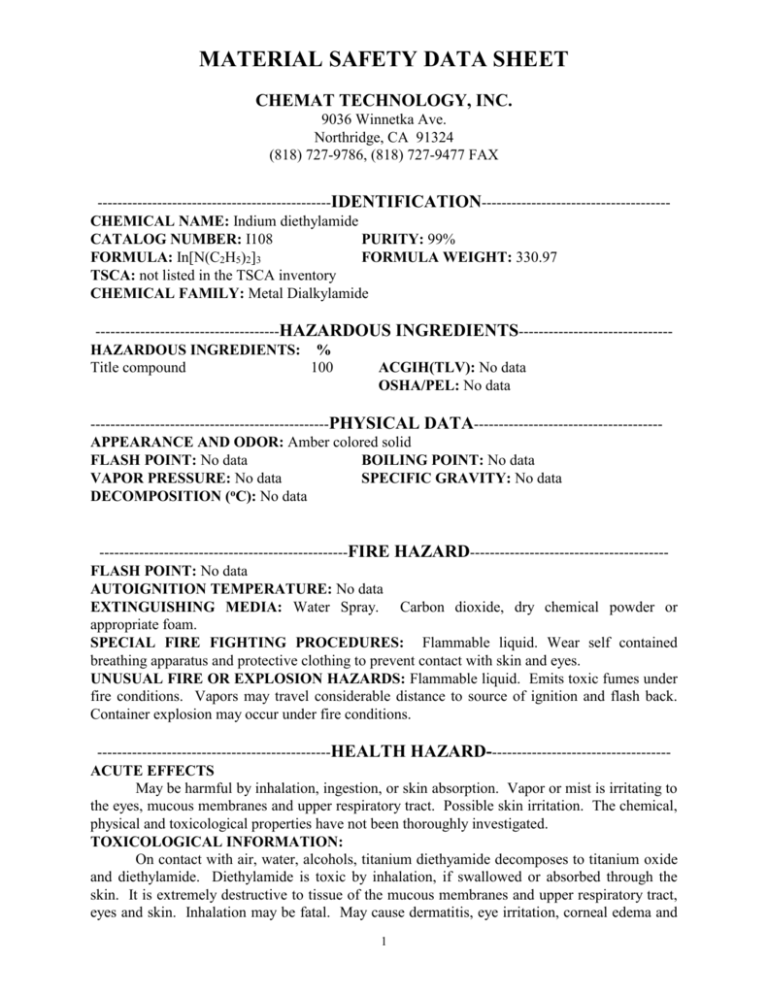
MATERIAL SAFETY DATA SHEET CHEMAT TECHNOLOGY, INC. 9036 Winnetka Ave. Northridge, CA 91324 (818) 727-9786, (818) 727-9477 FAX -----------------------------------------------IDENTIFICATION-------------------------------------CHEMICAL NAME: Indium diethylamide CATALOG NUMBER: I108 PURITY: 99% FORMULA: In[N(C2H5)2]3 FORMULA WEIGHT: 330.97 TSCA: not listed in the TSCA inventory CHEMICAL FAMILY: Metal Dialkylamide -------------------------------------HAZARDOUS INGREDIENTS------------------------------HAZARDOUS INGREDIENTS: % Title compound 100 ACGIH(TLV): No data OSHA/PEL: No data ------------------------------------------------PHYSICAL DATA-------------------------------------APPEARANCE AND ODOR: Amber colored solid FLASH POINT: No data BOILING POINT: No data VAPOR PRESSURE: No data SPECIFIC GRAVITY: No data DECOMPOSITION (oC): No data --------------------------------------------------FIRE HAZARD---------------------------------------FLASH POINT: No data AUTOIGNITION TEMPERATURE: No data EXTINGUISHING MEDIA: Water Spray. Carbon dioxide, dry chemical powder or appropriate foam. SPECIAL FIRE FIGHTING PROCEDURES: Flammable liquid. Wear self contained breathing apparatus and protective clothing to prevent contact with skin and eyes. UNUSUAL FIRE OR EXPLOSION HAZARDS: Flammable liquid. Emits toxic fumes under fire conditions. Vapors may travel considerable distance to source of ignition and flash back. Container explosion may occur under fire conditions. -----------------------------------------------HEALTH HAZARD------------------------------------ACUTE EFFECTS May be harmful by inhalation, ingestion, or skin absorption. Vapor or mist is irritating to the eyes, mucous membranes and upper respiratory tract. Possible skin irritation. The chemical, physical and toxicological properties have not been thoroughly investigated. TOXICOLOGICAL INFORMATION: On contact with air, water, alcohols, titanium diethyamide decomposes to titanium oxide and diethylamide. Diethylamide is toxic by inhalation, if swallowed or absorbed through the skin. It is extremely destructive to tissue of the mucous membranes and upper respiratory tract, eyes and skin. Inhalation may be fatal. May cause dermatitis, eye irritation, corneal edema and 1 chemical burns. Titanium oxide is a biologically inert compound, there is no evidence from human epidemiological data that titanium or its compounds cause pulmonary fibrosis. No skin sensitization, irritation or resorption through the skin has been observed. FIRST AID In case of contact with eyes, immediately flush eyes with large amounts of water for at least 15 minutes. In case of contact with skin, immediately wash skin with soap and flush with large amounts of water. If inhaled, remove to fresh air. If person not breathing, give artificial respiration. If breathing is difficult, give oxygen. If swallowed, wash out mouth with water provided person is conscious. Seek medical attention immediately. Wash all contaminated clothing before reuse. -----------------------------------------------REACTIVITY DATA----------------------------------STABILITY: Moisture-sensitive material. CONDITIONS TO AVOID: Contact with ignition source or heat. Container may react with ignition source, heat, or fire conditions. INCOMPATIBILITY: Strong oxidizing agents. HAZARDOUS DECOMPOSITION PRODUCTS: Toxic fumes of carbon monoxide CO, carbon dioxide CO2, nitrogen oxides and indium oxide. HAZARDOUS POLYMERIZATION: None ---------------------------------ENVIRONMENTAL INFORMATION----------------------SPILL OR LEAKAGE PROCEDURES: Evacuate contaminated area. Shut off all sources of ignition. Wear self-contained breathing apparatus, rubber boots and heavy rubber gloves. Cover with dry lime or soda ash. Pick up and store in closed container and hold for appropriate waste disposal. Ventilate area well. Wash spill site after material pickup is complete. WASTE DISPOSAL: Dissolve or mix the material with a combustible solvent and burn in a chemical incinerator equipped with an afterburner and scrubber. Observe and consult state, local, or federal EPA regulations for proper disposal and environmental regulations. ----------------------------------PROTECTION AND PRECAUTIONS----------------------VENTILATION REQUIREMENTS: Mechanical exhaust required. RESPIRATORY PROTECTION: NIOSH/MSHA approved respirator. PROTECTIVE GLOVES: Chemical resistant and safety gloves. EYE/FACE PROTECTION: ANSI approved safety goggles HANDLING AND STORAGE: Keep container tightly closed. Keep away from heat, sparks, and open flame. Store in a cool dry place. Do not breathe vapor. Irritant. OTHER PRECAUTIONS: Flammable. Irritant. Irritating to eyes, respiratory systems and skin. Keep away from source of ignition. No smoking. Keep container tightly closed in a cool well ventilated place. Wear suitable protective clothing Moisture sensitive. Store under nitrogen. -----------------------------------------------------------------------------------------------------------------The information herein is believed to be accurate and reliable as of the date compiled. However, Chemat Technology Inc. makes no representation, warranty or guarantee of any kind with respect to the information on this data sheet or any use of the product based upon this information. DATE PREPARED: July 6, 2005 2
